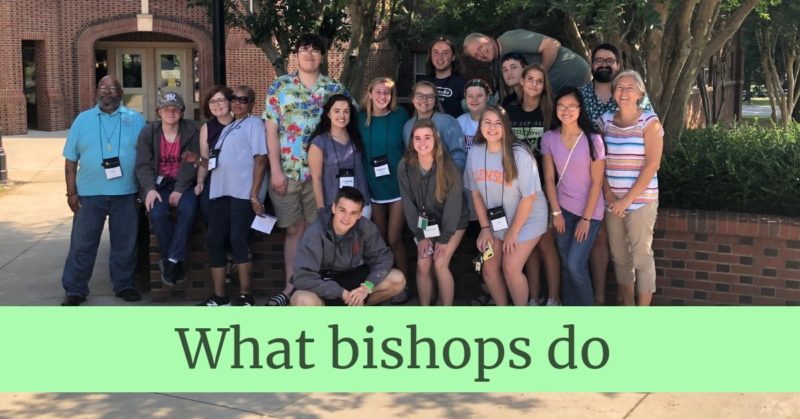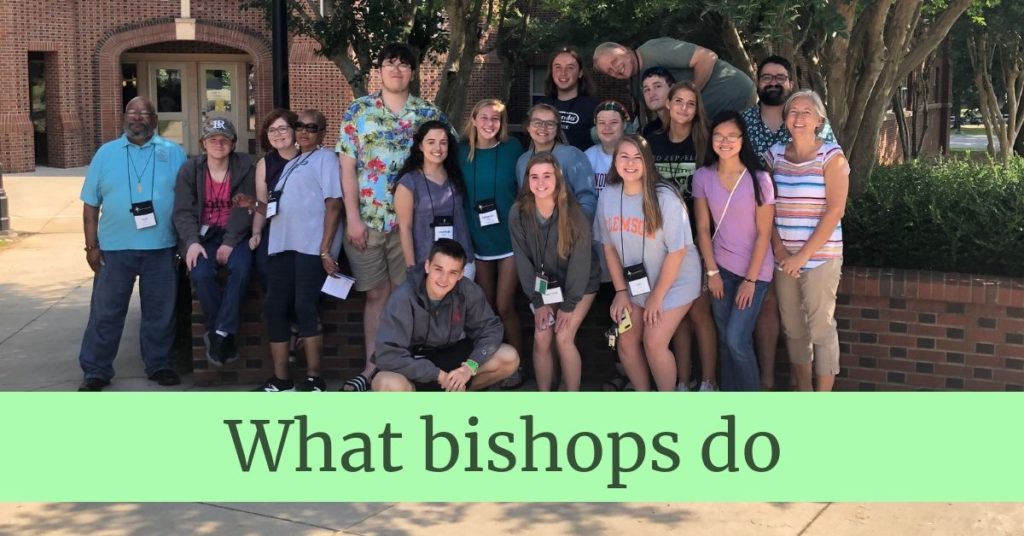What bishops do
I’ve spent last week from early each morning until dark each night at Lenoir-Rhyne University with 13 high schoolers from all over Region 9 in the ELCA. Though “Bishops’ School” has been happening for decades, several years ago it started rotating around to happen on the territory of the six Region 9 synods (comprising eight states, the Bahamas, Puerto Rico and the U.S. Virgin Islands). This year is the first year in its long history that the event has been in North Carolina. The school is a chance for high school students to dive deep into theology. Some of them are interested in professional church vocations. Some aren’t.
The bishop doesn’t lead the whole thing by a long shot, but I did get a chance to lead worship, teach one of the sessions, and spend an hour with the youth telling my call story. All of that was fun. The part that was a bit daunting to me was the hour-long session called “What Does a Bishop Do?” I mean, how do any of us talk to 16- and 17-year-olds for an hour about what we do at work and keep their attention? But it made me think, yet again, what DO I do? Why? What SHOULD I be doing?
There are actually multiple pages in every synod’s constitution that outline an answer. It begins by saying “As the synod’s pastor…” Many pastors introduce me and think of me as “the pastor to the pastors.” That’s not entirely accurate. A bishop is pastor of the synod, which is primarily made up of congregations. During my first year, I asked during a Q & A session in a parish I was visiting, “Who knows what synod means?” A well-meaning woman answered, “It’s like a union for pastors.” Well, no. Perhaps that’s how she’s perceived it, but a synod is foundationally a group of congregations—not a group of clergy. We intentionally lift up in our new synod vision: Vital Congregations. Then, Healthy Leaders. In that order. Congregations call pastors and deacons. Therefore, being pastor of a synod means primarily having oversight and responsibility for congregations.
Constitutionally, a bishop has “primary responsibility for the ministry of Word and Sacrament in this synod and its congregations, providing pastoral care and leadership for this synod, its congregations” and its rostered ministers. Only a bishop can ordain. Bishops advise and counsel our affiliated agencies and institutions (and serve on many of their boards). A bishop also interprets the mission and theology of the whole church to the synod and its congregations and attests letters of call. Much, I’ve learned, in such attestations is vouching that congregations followed proper procedure. If someone questions the following of proper procedure, the bishop sometimes is called in to void a decision and call for a “re-do,” following proper procedure. I’m required to consult regularly with the Conference of Bishops and other bishops and “foster awareness of other churches throughout the Lutheran world communion.”
Did you know that the bishop is mandated to “serve as the president of the synod corporation and be the chief executive and administrative officer of this synod, who is authorized and empowered, in the name of this synod, to sign deeds or other instruments”? I’m also charged with seeing that “the constitution and bylaws of the synod and of the churchwide organization are duly observed within this synod, and that the actions of the synod in conformity therewith are carried into effect.” Other duties include “supervision over the work of the other officers,” to “coordinate the work of all synodical staff members,” to “appoint all committees for which provision is not otherwise made,” to “be a member of all committees and any other organizational units of the synod,” and to appoint interim pastors when congregations are vacant and facilitate the call process when congregations seek a rostered minister.
If you ask my wife, what that looks like in real life is that I drive a lot, I’m gone a lot, I preach and speak way more than I ever did (and thus lots of prep time), I get—and try to answer—more than 200 phone calls, emails, text and FB messages a day, go to lots of meetings, and manage conflict and give pastoral care.
During July and August, I have scheduled:
• a two-day summit at Southern Seminary with Region 9 bishops
• a day-long pre-ELCA Assembly prep meeting with all NC Synod voting members
• a two-day Region 9 meeting in Atlanta around Women in Ministry issues
• a two-day family wedding (niece)
• at least one ordination (at LTSS)
• a Region 9 Bishops’ Annual three-day retreat near Gatlinburg, TN
• a two-day Lenoir-Rhyne Board meeting
• six evening meetings with congregations
• all but two Sundays preaching
• two monthly appointment days
• one-week family beach vacation
• one-week Triennial ELCA Churchwide Assembly
• a three-day Candidacy retreat
• a day-long Boundary training
• a two-day trip for retirement events at coastal congregations
• and, finally, departing for a three-week trip to Papua New Guinea for a Companion Synod visit—the first from our synod in at least 12 years.
All this is in addition to normal days in the office, staff supervision, conflicts that arise, call process, phone calls, emails, messages, etc. Then after this summer hiatus, things get busy in September and October.
I am privileged to walk this journey with you. This is just a little glimpse into what I talked about with the high schoolers on the topic of “What bishops do.” And, I’m still open to your suggestions as to the “should.”
Walking with you,
Bishop Tim Smith



